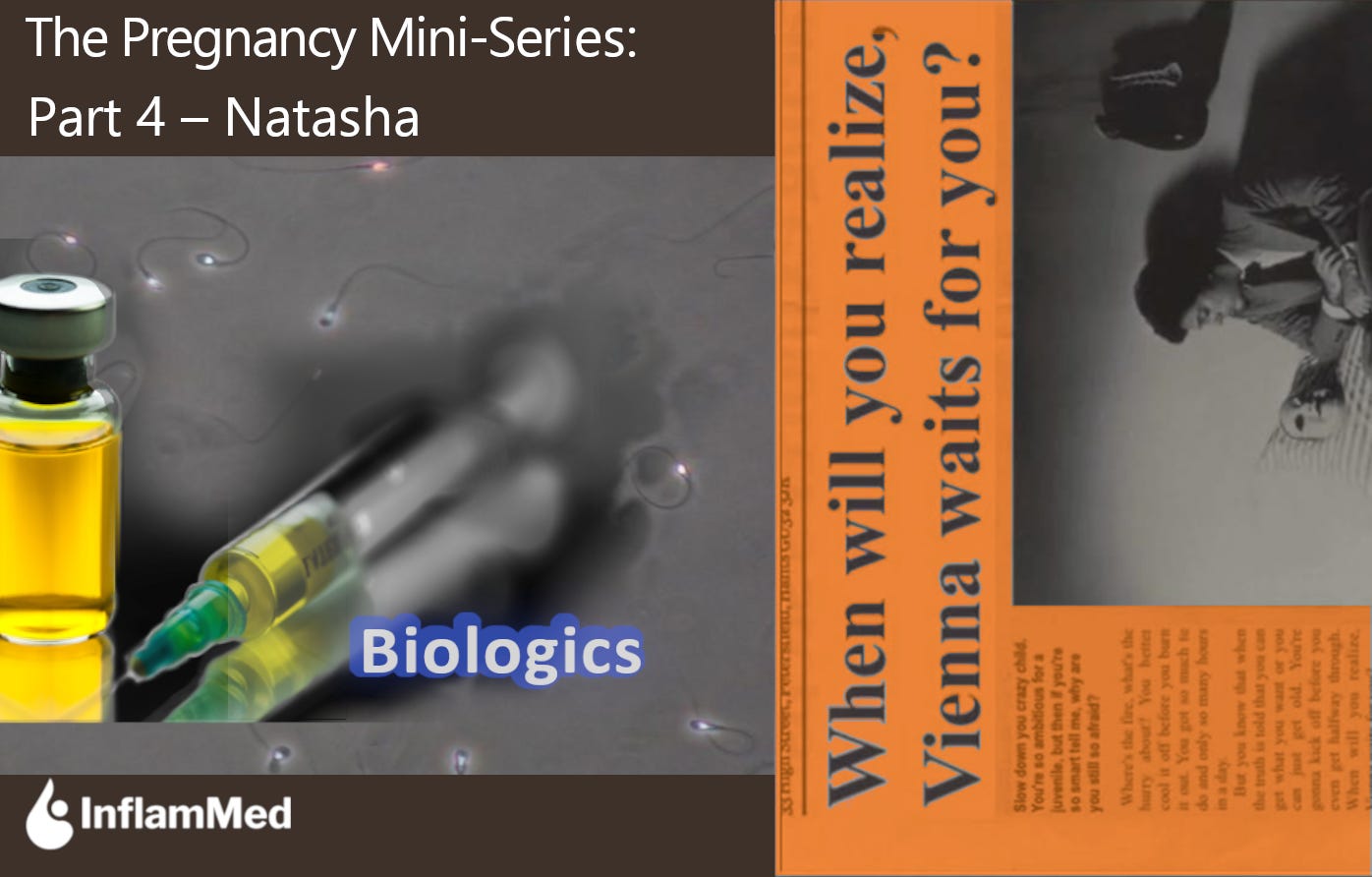Making Space for Parenthood
The pregnancy mini-series, Part 4
“Dancing through life, skimming the surface, gliding where turf is smooth…”
I’ve caught the Wicked fever, but right now, as I stand determined to try to get pregnant, I feel the exact opposite of gliding. It’s more like I am about to run the gauntlet—sharp turns, hidden barriers and yet more booby traps.
I suppose it’s the same for anyone planning to build a family. We all have our challenges, but I don’t hear much about my type of challenges. Managing chronic Inflammation is already this all-consuming job, one I can never quit. Add to that the unique reproductive circumstances faced by same-sex parents, and the path feels even less straightforward.
The Ghost of Chemo over Fertility
For almost two years, I was on a low dose of Methotrexate, a chemotherapy agent, to treat my Rheumatoid Arthritis (RA). The side effects were brutal: constant nausea, weight loss, and perhaps most alarmingly, my period stopped for over a year. At first, I was relieved—one less thing to manage. My consultant reassured me it wasn’t cause for concern, but my mum thought otherwise. And soon, I started questioning it too.
No periods meant something wasn’t right with my body. It was a sign that I wasn’t healthy enough to conceive, even if I wanted to. At the time, I didn’t want children, but the realisation that I couldn’t hit me like a ton of bricks. After much advocacy and trial and error, I transitioned to biologics. The side effects were minimal compared to Methotrexate, and with returning to an adequate weight, my hormones finally stabilised and my periods returned.
This episode caused me real anxiety. What if the damage was irreversible? To calm my fears, I got a fertility assessment. For anyone wondering, in the UK, the NHS does offer a basic fertility check for free—a small but meaningful step toward peace of mind. Although now reassured, that time in my life still haunts me.
Who knew?
My next concern was pain. Rheumatic pain and I are in constant negotiation and I assumed pregnancy would amplify it. After all, the physical and hormonal stress of pregnancy on a body already battling inflammation seemed like a recipe for disaster.
Encouraged to speak up by others, I told my Rheumatology team about my plans and expressed my fears. The head nurse didn’t bat an eye. She immediately explained that this wasn’t the case for most patients; in fact, it could be quite the opposite. What a surprise! Not only would my RA likely go into remission, but they also had enough data to know that roughly six weeks after the birth, I’d likely have a flare up. I was shocked. The discussion’s focus then shifted to medication, painting me a pretty detailed picture of my options, i.e., the drugs that are “safe” whilst pregnant.
What does this even mean, safe? Does it means safe for both mother and baby? Or baby first? Nothing is surely the safest then? Even if that means enduring, suffering through pregnancy. And if you do seek some relief, guilt piles on. Your own guilt and the one everyone else you feel puts on you. But as Elyse’s story1 told me, a broken vessel cannot be good for the baby either. Recently, I have come across another story echoing just that. Courtnay, also an RA patient, had to accept to take to prednisone2 she was in so much pain.
I had so much guilt, but that wasn’t healthy to be in that much pain and inflamed. That’s definitely not good for the baby, I’m sure.
Information is not a guarantee for anything, but having the conversation, my concerned being heard and met at least reassured me. With the right plan, I could manage this pregnancy, possibly without worsening my condition.
The Unique Challenges of LGBTQ+ Parenthood
In a same-sex relationship, the process of starting a family is far from straightforward.3 At some point, my partner and I will need to find the “right” sperm donor. We want the donor to reflect both of our heritages and so we are in search of a West Indian/Caribbean (black) donor. After an initial search, no matches were coming up. We were aware of shortages in donors of colour,4 but none? Maybe, we should not be so set on this; but upon reflection, we have decided this makes the most cultural sense for us as a future family.
And then there are the financial implications—intrauterine insemination, in vitro fertilization or other assisted reproductive methods aren’t cheap.
And when is the right time to take this step? Will there ever be a perfect time?
Right now, every step forward seems to bring at least another three new questions.
Where I Stand Now
I’m beginning to learn to embrace the uncertainty, accepting that my path, our path, will have as many turns as it needs. It only adds depth to the journey. These days, I find that Billy Joel’s Vienna both holds me up and cradles me, every word of it.
Unlike most of my chronic illness journey to-date, this chapter will not be one of loneliness. I’m determined to lean on my friends, this community, and the power of self-advocacy to navigate what lies ahead.
Prednisone is a corticosteroid. Full article on Rheumatology Advisor
Some resources: information from the HFEA (UK independent regulator), community support from the UK charity FFLAG, community support in France and in French collectif famille·s.




